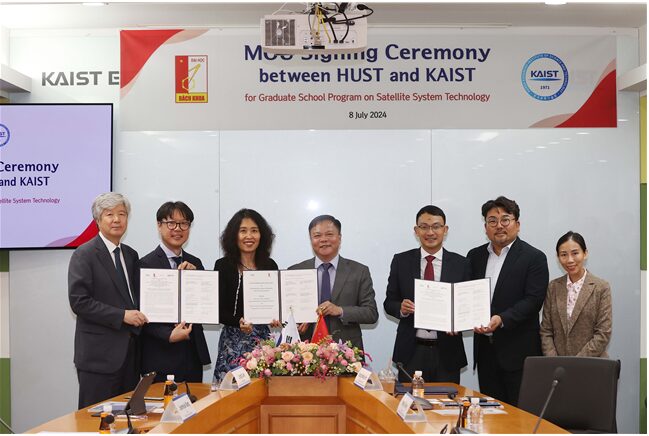Professor Chan-Hyun Youn Signs MOU to Establish a Graduate Program in Satellite System Technology with Vietnam’s Hanoi University of Science and Technology and Daejeon-based Satellite Specialist Companies

<(from left) Professor Chan-Hyun Youn, Young Wook Kim CEO(IOPS), So Young Kim Vice President, Nguyen Phong Dien Vice President(HUST), Hoang Si Hong Vice Dean(HUST), Myung Jin Choi CEO(HANCOM InSpace) Truong Thu Huong(HUST)>
Professor Chan-Hyun Youn is advancing a collaboration with Vietnam’s Hanoi University of Science and Technology (HUST) and specialized satellite communication and service companies in Daejeon to establish a graduate program focused on satellite systems and application technologies.
This collaboration aims to enhance expertise in various fields such as ocean monitoring and climate change response using satellite systems and data, promoting research and educational cooperation between Korean and Vietnamese universities. Specifically, KAIST aims to strengthen industry-academia cooperation related to future satellite systems and service technologies between Korea and Vietnam, based on the satellite application technology jointly researched by KAIST and led by the Korea Aerospace Research Institute.
To achieve this, KAIST and HUST have agreed to pursue educational and research cooperation in satellite systems and application technologies and have signed a Memorandum of Understanding (MoU) to establish a specialized graduate program in satellite system technology at KAIST. The School of Electrical Engineering at KAIST (KAIST-EE) and the School of Electrical Engineering at HUST (HUST-SEEE) will closely cooperate on detailed educational content, including curriculum development and student exchanges.
KAIST has also separately signed MoU to support the establishment of the ‘Graduate Program in Satellite System Technology (GST)’ with HUST and venture companies such as I-OPS Co., Ltd. (CEO: Youngwook Kim) and Hancom InSpace Co., Ltd. (CEO: Myungjin Choi).
I-OPS Co., Ltd. and Hancom InSpace Co., Ltd., specialized satellite technology companies based in Daejeon, which is becoming the hub of space and satellite technology in the NewSpace era, will support technological cooperation and the nurturing of outstanding talents from HUST. Furthermore, they plan to collaborate with Viettel, Vietnam’s state-owned communication system and service company, on satellite technology and application services, jointly with HUST.
Professor Chan-Hyun Youn stated that this collaboration aims to enhance the global business competitiveness of the domestic satellite industry by advancing the development and operational capabilities of next-generation satellite systems. He emphasized that the theoretical and advanced expertise accumulated by the School of Electrical Engineering at KAIST in core satellite technologies, such as satellite onboard computing, sensing, communication and antenna, and signal processing, combined with the integrative education and research and development capabilities, will mutually benefit from the collaboration with domestic satellite-related companies.
This collaboration is expected to contribute to the development and global competitiveness of the space industry in both Korea and Vietnam through the establishment of a global satellite education network between the academic and industrial sectors of both countries.